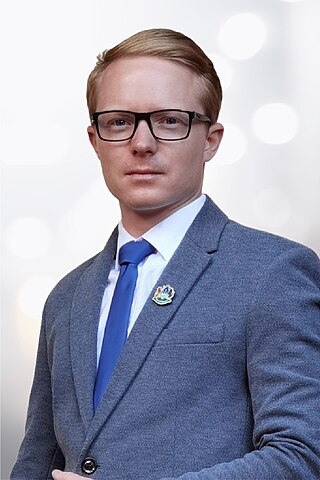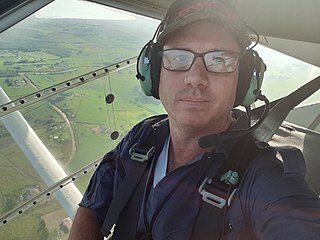Related Research Articles

The Inkatha Freedom Party is a conservative political party in South Africa, which is a part of the current South African government of national unity together with the African National Congress (ANC). Although registered as a national party, it has had only minor electoral success outside its home province of KwaZulu-Natal. Mangosuthu Buthelezi, who served as chief minister of KwaZulu during the Apartheid period, founded the party in 1975 and led it until 2019. He was succeeded as party president in 2019 by Velenkosini Hlabisa.

The KwaZulu-Natal Sharks Board (KZNSB), previously the Natal Sharks Board and Natal Anti-Shark Measures Board is an organisation that maintains a "shark control" program off the coast of KwaZulu-Natal Province, South Africa, at 37 places. The purpose of the nets and drum lines is to reduce the number of shark attacks. It was founded as a statutory body in 1962, when the city of Durban's netting operations were extended to other parts of the coast in the then Natal Province. It is headquartered in uMhlanga, north of Durban.
There have been many political assassinations in post-apartheid South Africa. In 2013 it was reported that there had been more than 450 political assassinations in the province of KwaZulu-Natal since the end of apartheid in 1994. In July 2013 the Daily Maverick reported that there had been "59 political murders in the last five years". In August 2016 it was reported that there had been at least twenty political assassinations in the run up to the local government elections on the 3rd of August that year, most of them in KwaZulu-Natal.
The Ingonyama Trust is a corporate entity that was established by the KwaZulu Legislative Assembly in April 1994, days before South Africa's first democratic elections. The establishment of the Ingonyama Trust resulted from a secret deal between the National Party and the Inkatha Freedom Party that convinced the IFP to set aside its planned boycott of elections. The Ingonyama Trust was founded as a repository for the communal land of the Zulu Nation with His Majesty the King as the sole Trustee. In 1997 the democratic National Parliament of the Republic of South Africa amended this Act, so that it is consistent with modern constitutional order. This amendment involved changes to all sections of the Act by way of the KwaZulu - Natal Ingonyama Trust Amendment Act 9 of 1997. This Act established the Trust Board appointed by the Minister of Agriculture, Land Reform and Rural Development following a consultative process with the KwaZulu-Natal Premier, Executive Council and the KwaZulu - Natal Provincial House of Traditional Leaders. The King remains the sole Trustee and he chairs the Board.

Edward Senzo Mchunu is a South African politician currently serving as Minister of Police since 30 June 2024. A member of the African National Congress (ANC), he has been a cabinet minister since May 2019. He was formerly the Premier of KwaZulu-Natal between 22 August 2013 and 23 May 2016.
Zwakele Maxwell Mncwango is a South African politician who is the provincial chairperson of ActionSA in KwaZulu-Natal. He was a Member of the KwaZulu-Natal Legislature from 2018 to 2022 and served as the Leader of the Opposition in the KwaZulu-Natal Legislature from 2018 to 2019. He was the Provincial Leader of the KwaZulu-Natal Democratic Alliance (DA) from 2015 to 2021. Mncwango was the party's KwaZulu-Natal Premier candidate for the 2019 election.

Sihle Zikalala is a South African politician from KwaZulu-Natal who has been a Member of the National Assembly of South Africa since 2023, representing the African National Congress. He was Minister of Public Works and Infrastructure from March 2023 to June 2024. Before his redeployment to the national government, he had been the Member of the Executive Council (MEC) for Cooperative Governance and Traditional Affairs in KwaZulu-Natal and a Member of the KwaZulu-Natal Legislature.
Francoise Adrianus Rodgers, known as Francois Rodgers, is a South African politician from KwaZulu-Natal who has been the Member of the Executive Council for Finance since 2024 and the provincial leader of Democratic Alliance (DA) since 2021.

Nomusa Dube-Ncube is a South African politician and former diplomat who was the 9th Premier of KwaZulu-Natal from August 2022 to June 2024. A member of the African National Congress, she is the first woman to hold the office. She was succeeded by Thami Ntuli.

Christopher "Chris" John Pappas is a South African politician who is the mayor of the uMngeni Local Municipality. A member of the Democratic Alliance, he served as party's deputy provincial leader from 2021 until 2023. Pappas served as a member of the eThekwini city council from 2016 until 2019 and as a DA Member of the KwaZulu-Natal Legislature from 2019 to 2021.

Heinz Ulrik de Boer is a South African journalist and politician who has been a Member of the KwaZulu-Natal Legislature since May 2019. A member of the Democratic Alliance, he was previously the ward councillor for Umhlanga in the eThekwini Metropolitan Municipality.
Kwazikwenkosi Innocent Mshengu is a South African lawyer and African National Congress politician who served as the Member of the Executive Council (MEC) for Education in KwaZulu-Natal until 11 August 2022 when he was replaced with Mbali Frazer by the new KwaZulu-Natal Premier Nomusa Dube-Ncube. He served as a member of the KwaZulu-Natal Legislature from May 2019 until February 2023. Mshengu is the provincial chairperson of the African National Congress Youth League.
Neliswa Peggy Nkonyeni is a South African politician and educator. A member of the African National Congress, she was the Member of the Executive Council (MEC) for Finance in KwaZulu-Natal from August 2022 until June 2024.

Sibongiseni Dhlomo is a South African politician and medical doctor for the African National Congress. Dhlomo is the current deputy minister of health for the Republic of South Africa.
Thembeka Vuyisile Buyisile Mchunu is a South African politician from KwaZulu-Natal serving as a Member of the National Assembly of South Africa since 2019. A member of the African National Congress, she served as the Executive Mayor of the Uthungulu District Municipality from 2011 to 2016. She is married to Senzo Mchunu, the current Minister of Water and Sanitation and the former premier of KwaZulu-Natal.
Nkululeko Ntuthuko Mahlaba is a South African politician and healthcare practitioner. A member of the African National Congress, he serves as the party's provincial treasurer in KwaZulu-Natal as well as the chairperson of the party's Mbuso Kubheka Region. From August 2022 to May 2023, he was the MEC for Human Settlements and Public Works and he then served as the MEC for Sports, Arts and Culture from August 2022 until June 2024. Mahlaba previously served as the executive mayor of the Newcastle Local Municipality from 2019 to 2021.
Nhlanhla Mzungezwa Hadebe is a South African politician who has served as a permanent delegate to the National Council of Provinces from KwaZulu-Natal since 2022. Hadebe is a member of the Inkatha Freedom Party.
Richard Themba Mthembu is a South African politician who represented the African National Congress in the KwaZulu-Natal Provincial Legislature from 2009 until 2024. He was formerly KwaZulu-Natal's Member of the Executive Council for Agriculture and Rural Development from June 2016 to May 2019. He has also served as Provincial Secretary of the South African Communist Party in KwaZulu-Natal since 2002.
Lindumusa Bekizitha Gabriel Ndabandaba is a retired South African politician and academic who served in the National Assembly and KwaZulu-Natal Provincial Legislature from 1999 to 2014. He represented the Inkatha Freedom Party (IFP) until 2003, when he crossed the floor to the African National Congress (ANC).
The Government of KwaZulu-Natal is the subnational government of the South African province of KwaZulu-Natal (KZN). The politics of the province take place in the framework of a constitutional monarchy and liberal multi-party parliamentary democracy within a constitutional republic whereby the King of the Zulu Nation is the ceremonial figurehead of an elected government. The provincial government comprises the second sphere of government of South Africa and consists of three branches with checks and balances between them as follows:
References
- 1 2 3 4 5 6 7 8 9 10 11 12 13 Who's Who, Southern Africa http://whoswho.co.za/graham-mcintosh-4618 Archived 2014-08-29 at the Wayback Machine
- ↑ "Free State election official wounded". Independent Online. 22 April 2009. Retrieved 20 October 2015.
- ↑ Delegates to the New York Herald Tribune Youth Forum http://htwyfaa.org/virtual/101//Documents/pdf/List%20of%20Delegates.pdf
- 1 2 3 "Longest serving MP calls it a day". www.enca.com. Retrieved 29 June 2018.
- 1 2 3 4 5 "From John Vorster to Jacob Zuma - Graham McIntosh - NEWS & ANALYSIS | Politicsweb". www.politicsweb.co.za. Retrieved 29 June 2018.
- ↑ Daily News, 14 January 1976
- ↑ Cape Argus, 1 June 1985
- ↑ The Citizen, 19 September 2013 http://citizen.co.za/49667/iec-bill-adopted-amid-da-court-bid/ Archived 5 March 2016 at the Wayback Machine
- ↑ Staff Reporter. "DA: 'Mbeki has lost the plot'". The M&G Online. Retrieved 29 June 2018.
- ↑ "Battle over overseas vote persists | IOL News" . Retrieved 29 June 2018.
- 1 2 "ICD to probe Selebi swearing claim | IOL News" . Retrieved 29 June 2018.
- ↑ "DA: Candidates represent will of the people | IOL News" . Retrieved 29 June 2018.
- ↑ "DP shoots holes in Firearms Bill | IOL News" . Retrieved 29 June 2018.
- ↑ "Defiant Tshwete to draft strict gun law | IOL News" . Retrieved 29 June 2018.
- ↑ "SA needs 'bad boy' list | IOL Business Report" . Retrieved 29 June 2018.
- ↑ Parliament of the RSA, News http://www.parliament.gov.za/live/content.php?Item_ID=5761&Revision=en/0&SearchStart=0
- ↑ Parliament of the RSA, InSession, Vol. 14, issue 3, March/April 2014, 'Making SA Better', http://www.parliament.gov.za/live/content.php?Item_ID=5952
- ↑ Mail & Guardian, 31 March 1995 http://mg.co.za/print/1995-03-31-dont-use-bantustan-solutions
- ↑ "Dassies set new record at wildlife auction | IOL News" . Retrieved 29 June 2018.
- ↑ Institute of Race Relations, 2014 Annual Report http://irr.org.za/
- ↑ Eco, Agri. "AgriEco | Northern KZN". www.agrieco.net. Retrieved 29 June 2018.
- ↑ "The Michaelhouse Archives - Preview". archives.michaelhouse.org. Retrieved 29 June 2018.
- ↑ "The Michaelhouse Archives - Preview". archives.michaelhouse.org. Retrieved 29 June 2018.
- ↑ St. Michael Awardees http://www.michaelhouse.org/wp-content/uploads/2015/01/St-Michael-awardees.pdf